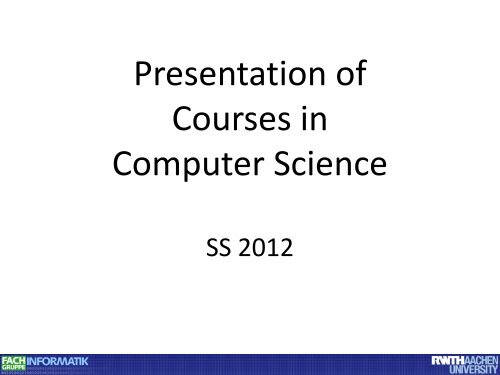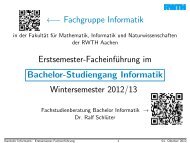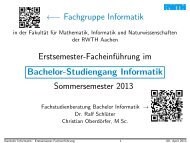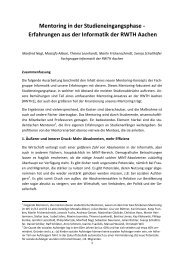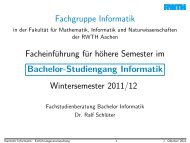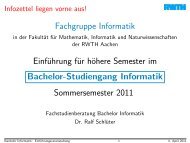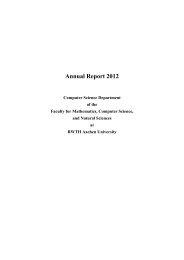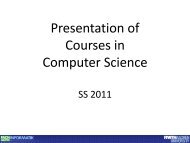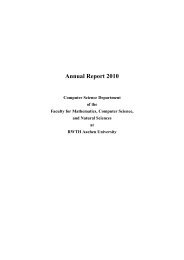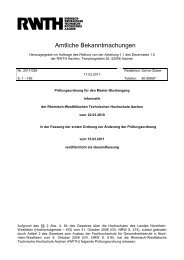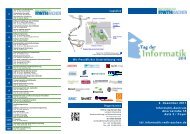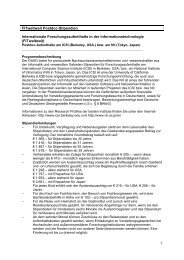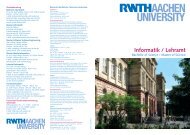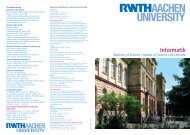M - Fachgruppe Informatik an der RWTH Aachen
M - Fachgruppe Informatik an der RWTH Aachen
M - Fachgruppe Informatik an der RWTH Aachen
Create successful ePaper yourself
Turn your PDF publications into a flip-book with our unique Google optimized e-Paper software.
Presentation of<br />
Courses in<br />
Computer Science<br />
SS 2012
Presentation of Courses SS12<br />
• Overview of all elective courses<br />
for Bachelor / Master<br />
• Sorted according to 4 areas of Computer Science<br />
1. Theoretische <strong>Informatik</strong> (Theoretical Computer Science)<br />
2. Software & Kommunikation (Software & Communication)<br />
3. Daten- & Informationsmgmt. (Data- & Information-M<strong>an</strong>agement)<br />
4. Angew<strong>an</strong>dte <strong>Informatik</strong> (Applied Computer Science)<br />
• Tr<strong>an</strong>sition slides + h<strong>an</strong>douts contain key information<br />
about courses (title, room, time schedule)<br />
• Labels:<br />
B<br />
Bachelor<br />
M Master
Presentation Rules<br />
• Each professor gets 2 minutes<br />
• Slide presentation proceeds automatically<br />
• Acceleration is possible, slowing down is not<br />
• Next professor takes over during tr<strong>an</strong>sition slide<br />
(which are shown for 15 seconds)
Bereich 3:<br />
Daten- und<br />
Informationsm<strong>an</strong>agement
Bereich 3: Daten- und Informationsm<strong>an</strong>agement<br />
Informationssysteme und Datenb<strong>an</strong>ken<br />
Lehrstuhl <strong>Informatik</strong> 5<br />
Prof. Dr. Matthias Jarke<br />
Adv<strong>an</strong>ced Data Models (V3 Ü1, 6 ECTS)<br />
V: Di. 10:00 –11:30 5053.2<br />
Fr. 10:00 –11:30 5053.2 (14 tgl.)<br />
Ü: Fr. 10:00 –11:30 5053.2 (14 tgl.)<br />
Start: 03.04.2012<br />
M
Adv<strong>an</strong>ced Data Models<br />
(V3/Ü1, Quix/Jarke)<br />
Master<br />
Lecture: Tuesdays, 10.00-11.30 (start: April 3)<br />
Fridays, 10.00-11.30 (bi-weekly, start: April 13)<br />
Exercises: Fridays, 10.00-11.30 (bi-weekly, start: April 27)<br />
Room 5053.2 (seminar room B-IT RS, opposite to AH 6)<br />
• Data Modeling & Integration<br />
• Conceptual, semi-structured,<br />
& object-oriented data models<br />
• Mappings between<br />
data models<br />
• Metadata M<strong>an</strong>agement<br />
• Schema Integration & Evolution
Bereich 3: Daten- und Informationsm<strong>an</strong>agement<br />
Wissensbasierte Systeme<br />
LuFG <strong>Informatik</strong> 5<br />
Prof. Gerhard Lakemeyer, Ph.D.<br />
Introduction to Knowledge Representation (VÜ3, 6 ECTS)<br />
V: Mo. 11:45 – 13:15 AH IV<br />
Mi. 08:15 – 09:45 AH IV<br />
Ü: Mi. 15:15 – 16:45 AH III<br />
Start: 11.04.2012<br />
B M
Research at KBSG<br />
• Knowledge Representation (KR)<br />
Representation <strong>an</strong>d Inference,<br />
especially in dynamic settings<br />
(actions <strong>an</strong>d their effects)<br />
• Cognitive Robotics<br />
High-level control of mobile robots<br />
using methods from KR<br />
Applications: Service <strong>an</strong>d soccer robots
Two of our Robots
Knowledge Representation<br />
• Introduces basic methods of knowledge<br />
representation, including:<br />
first-or<strong>der</strong> logic, procedural control, description logics,<br />
rule-based systems, default reasoning, diagnosis,<br />
reasoning about action, pl<strong>an</strong>ning<br />
• Prerequisites: mathematical logic.<br />
• Lectures start April 11.
Bereich 3: Daten- und Informationsm<strong>an</strong>agement<br />
Frauenhofer Institut für Angew<strong>an</strong>dte<br />
Informationstechnik (FIT)<br />
Prof. Dr. Wolfg<strong>an</strong>g Prinz, Prof. Dr. Thomas Rose<br />
Computer Supported Cooperative Work (CSCW) (V2 Ü1, 4 ECTS)<br />
V: Mi. 11:45 – 13:15 AH VI<br />
Ü: t.b.a<br />
Start: 11.04.2012<br />
M<br />
Prozess M<strong>an</strong>agement (V2 Ü1, 4 ECTS)<br />
V: Mi. 10:00 – 11:30 Seminarraum I5<br />
Ü: Mi. 11:30 – 13:00 Seminarraum I5 (14 tgl.)<br />
Start: 11.04.2012<br />
M
Process M<strong>an</strong>agement<br />
(V2/Ü1, Rose)<br />
Master<br />
Lecture: Wednesdays, 10:00 – 11:30 (start: April 11)<br />
Exercises: Wednesdays, 11:30 – 13:00 (bi-weekly, start: April 18)<br />
Room 6202 (seminar room <strong>Informatik</strong> 5)<br />
• Process m<strong>an</strong>agement requirements,<br />
concepts <strong>an</strong>d approaches<br />
• Process pl<strong>an</strong>ning tools, execution<br />
support <strong>an</strong>d exch<strong>an</strong>ge st<strong>an</strong>dards<br />
• Customisation concepts<br />
• Ad-hoc <strong>an</strong>d emergent workflows
Computer Supported<br />
Cooperative Work (CSCW)<br />
(V2/Ü1, Prinz)<br />
Master<br />
Lecture: Wednesdays, 11:45 – 13:15 (AH 6, start: April 11)<br />
Topics<br />
• Video Conferencing & Media Spaces<br />
• Synchronous Cooperation & Shared Applications<br />
• Shared Information Spaces & Document M<strong>an</strong>agement<br />
• Workflow M<strong>an</strong>agement<br />
• Social Media<br />
You will learn<br />
• Approaches to support hum<strong>an</strong> cooperation<br />
• Concepts for the design <strong>an</strong>d development of cooperation<br />
systems<br />
• Application of Groupware in Org<strong>an</strong>isations
Bereich 3: Daten- und Informationsm<strong>an</strong>agement<br />
Datenm<strong>an</strong>agement und -exploration<br />
Lehrstuhl <strong>Informatik</strong> 9<br />
Prof. Dr. Thomas Seidl<br />
Exploring High-dimensional Data:<br />
Adv<strong>an</strong>ced Mining Techniques (V3 Ü2, 6 ECTS)<br />
V: Di. 13:30 – 15:30 AH VI<br />
Ü: Do. 13:30 – 15:15 AH VI<br />
Start: 10.04.2012<br />
M
SS 2012<br />
Topics <strong>an</strong>d lectures offered by i9<br />
Learn more on dme.rwth-aachen.de/teaching<br />
• Exploring High-dimensional Data: Adv<strong>an</strong>ced Mining Techniques<br />
• How to turn 'just data' into knowledge?<br />
• Customer segmentation<br />
• Detection of credit card frauds<br />
• Patterns in gene expression data<br />
• How to h<strong>an</strong>dle complex data sources?<br />
• Multi-source mining (Amazon, eBay, …)<br />
• Very high-dimensional data<br />
• How to incorporate background knowledge?<br />
• Exploring Multimedia Data: Content-Based Search & Retrieval<br />
• Images, Videos, …<br />
• Exploring Temporal <strong>an</strong>d Graph Data: Mining & Retrieval<br />
• Social Networks, Stock Market Data, Streams, …<br />
• Data Mining Algorithms (Bachelor course)<br />
• Basic mining techniques
Bereich 3: Daten- und Informationsm<strong>an</strong>agement<br />
Computerunterstütztes Lernen<br />
Computerunterstütztes Lernen<br />
LuFG <strong>Informatik</strong> 9<br />
Prof. Dr. Ulrik Schroe<strong>der</strong>
Research & Teaching<br />
Engineering next-generation<br />
learning environments<br />
• Personal learning environments<br />
• Open <strong>an</strong>d networked learning<br />
environments<br />
Intelligent Web <strong>an</strong>d<br />
mobile technologies<br />
• Web mining<br />
• Mobile learning in context<br />
Innovative learning theories <strong>an</strong>d<br />
pedagogical models<br />
Learning Analytics<br />
• Educational data mining<br />
• Open assessment <strong>an</strong>d intelligent<br />
feedback<br />
• Lifelong learner modeling<br />
• Intelligent recommendation<br />
Didactics of computer science<br />
• Didactics of curricular <strong>an</strong>d<br />
extracurricular learning of CS<br />
• Technology enh<strong>an</strong>ced learning for<br />
school students<br />
• Educational technologies<br />
• Gen<strong>der</strong> <strong>an</strong>d diversity studies<br />
19 02.04.2012<br />
Ulrik Schroe<strong>der</strong> (Learning Technologies)
Engineering next-generation learning environments<br />
Engineering next-generation<br />
learning environments<br />
• Personal learning environments<br />
• Open <strong>an</strong>d networked learning<br />
environments<br />
Intelligent Web <strong>an</strong>d<br />
mobile technologies<br />
• Web mining<br />
• Mobile learning in context<br />
Innovative learning theories <strong>an</strong>d<br />
Personal Learning Environments<br />
pedagogical models<br />
Learning Analytics<br />
• Educational data mining<br />
• Open assessment <strong>an</strong>d intelligent<br />
feedback<br />
• Lifelong learner modeling<br />
• Intelligent recommendation<br />
Didactics of computer science<br />
• Didactics of curricular <strong>an</strong>d<br />
extracurricular learning of CS<br />
• Technology enh<strong>an</strong>ced learning for<br />
school students<br />
• Educational technologies<br />
• Gen<strong>der</strong> <strong>an</strong>d diversity studies<br />
20 02.04.2012<br />
Ulrik Schroe<strong>der</strong> (Learning Technologies)
Intelligent Web <strong>an</strong>d mobile technologies<br />
Engineering next-generation<br />
learning environments<br />
• Personal learning environments<br />
• Open <strong>an</strong>d networked learning<br />
environments<br />
Intelligent Web <strong>an</strong>d<br />
mobile technologies<br />
• Web mining<br />
• Mobile learning in context<br />
Innovative learning theories <strong>an</strong>d<br />
Learning in context<br />
pedagogical models<br />
Learning Analytics<br />
• Educational data mining<br />
• Open assessment <strong>an</strong>d intelligent<br />
feedback<br />
• Lifelong learner modeling<br />
• Intelligent recommendation<br />
Didactics of computer science<br />
• Didactics of curricular <strong>an</strong>d<br />
extracurricular learning of CS<br />
• Technology enh<strong>an</strong>ced learning for<br />
school students<br />
• Educational technologies<br />
• Gen<strong>der</strong> <strong>an</strong>d diversity studies<br />
21 02.04.2012<br />
Ulrik Schroe<strong>der</strong> (Learning Technologies)
Learning <strong>an</strong>alytics<br />
Engineering next-generation<br />
learning environments<br />
• Personal learning environments<br />
• Open <strong>an</strong>d networked learning<br />
environments<br />
Intelligent Web <strong>an</strong>d<br />
mobile technologies<br />
• Web mining<br />
• Mobile learning in context<br />
Innovative learning theories <strong>an</strong>d<br />
Educational Data Mining<br />
pedagogical models<br />
Learning Analytics<br />
• Educational data mining<br />
• Open assessment <strong>an</strong>d intelligent<br />
feedback<br />
• Lifelong learner modeling<br />
• Intelligent recommendation<br />
Didactics of computer science<br />
• Didactics of curricular <strong>an</strong>d<br />
extracurricular learning of CS<br />
• Technology enh<strong>an</strong>ced learning for<br />
school students<br />
• Educational technologies<br />
• Gen<strong>der</strong> <strong>an</strong>d diversity studies<br />
22 02.04.2012<br />
Ulrik Schroe<strong>der</strong> (Learning Technologies)
Research & Teaching<br />
Engineering next-generation<br />
learning environments<br />
• Personal learning environments<br />
• Open <strong>an</strong>d networked learning<br />
environments<br />
Intelligent Web <strong>an</strong>d<br />
mobile technologies<br />
• Web mining<br />
• Mobile learning in context<br />
Innovative learning theories <strong>an</strong>d<br />
pedagogical models<br />
Learning Analytics<br />
• Educational data mining<br />
• Open assessment <strong>an</strong>d intelligent<br />
feedback<br />
• Lifelong learner modeling<br />
• Intelligent recommendation<br />
Didactics of computer science<br />
• Didactics of curricular <strong>an</strong>d<br />
extracurricular learning of CS<br />
• Technology enh<strong>an</strong>ced learning for<br />
school students<br />
• Educational technologies<br />
• Gen<strong>der</strong> <strong>an</strong>d diversity studies<br />
23 02.04.2012<br />
Ulrik Schroe<strong>der</strong> (Learning Technologies)
Teaching: Bachelor Electives<br />
Didactics<br />
Teaching Practice<br />
Service<br />
Java Programming<br />
Teaching Practice<br />
Seminar<br />
Basics of Software<br />
Engineering<br />
Introduction to<br />
CS Didactics<br />
Labs<br />
Web<br />
Technologies<br />
Summer term<br />
2013<br />
Foundations of<br />
eLearning<br />
Adv<strong>an</strong>ced<br />
Learning<br />
Technologies<br />
Seminars<br />
Practical Computer<br />
Science<br />
eLearning<br />
24<br />
02.04.2012<br />
Ulrik Schroe<strong>der</strong> (Learning Technologies)
Bereich 2: Software und Kommunikation<br />
LuFG IT-Security<br />
Prof. Dr. Ulrike Meyer<br />
Security in Mobile Communication (V3 Ü1, 6 ECTS)<br />
V: Di. 10:00 – 11:30 UMIC 025<br />
Ü: Do. 10:00 – 11:30 UMIC 025 (14 tgl.)<br />
Start: 11.04.2011<br />
M
26<br />
Security in Mobile Communication<br />
WLAN<br />
Bluetooth<br />
GSM<br />
UMTS<br />
LTE<br />
RFID<br />
DECT<br />
Security in current <strong>an</strong>d future wireless communication protocols <strong>an</strong>d network<br />
stacks.<br />
Builtin security features, weaknesses, real-world attacks, mitigations, <strong>an</strong>d new developments.<br />
WiMAX<br />
Femto<br />
Sensor<br />
Networks
Bereich 1:<br />
Theoretische <strong>Informatik</strong>
Bereich 1: Theoretische <strong>Informatik</strong><br />
Logik und Theorie diskreter Systeme<br />
Lehrstuhl <strong>Informatik</strong> 7<br />
Prof. Dr. Dr.h.c. Wolfg<strong>an</strong>g Thomas, PD Dr. Christof Löding<br />
Angew<strong>an</strong>dte Automatentheorie (V3 Ü2, 6 ECTS)<br />
V: Mo. 14:15 – 15:45 AH II<br />
Mi. 08:15 – 09:45<br />
AH V<br />
Ü: Mi. 13:30 – 15:00 AH IV<br />
Start: 04.04.2012<br />
B<br />
M<br />
Infinite Games (V3 Ü2, 4 ECTS)<br />
V: Di. 11:45 – 13:15 AH VI<br />
Do. 11:45 – 13:15 AH III<br />
Ü: Do. 10:00 – 11:30 AH I<br />
Start: 04.04.2012<br />
M
Lehrstuhl <strong>Informatik</strong> 7<br />
Logik und Theorie diskreter Systeme<br />
Prof. Dr. Wolfg<strong>an</strong>g Thomas<br />
Forschungsgebiete:<br />
Automatentheorie<br />
Algorithmische Programmverifikation und -<br />
synthese<br />
Unendliche Spiele und reaktive Systeme<br />
Logik <strong>der</strong> <strong>Informatik</strong><br />
Sprechstunde:<br />
Montag, 11:15 – 12:15 Uhr<br />
URL: http://www.automata.rwth-aachen.de
Lehrstuhl <strong>Informatik</strong> 7<br />
Logik und Theorie diskreter Systeme<br />
Prof. Dr. Wolfg<strong>an</strong>g Thomas<br />
Applied Automata Theory (W. Thomas)<br />
V3 Mon, 14:15 – 15:45, AH II; Wed, 08:15 – 09:45, AH V<br />
Ü2<br />
Wed , 13:30 – 15:00, AH IV<br />
Begin: Wed, 4th April 2012 08:15 h, AH V<br />
Keywords:<br />
• Minimization of automata<br />
• Weighted automata, probablistic automata<br />
• Automata <strong>an</strong>d logic<br />
• Pushdown-systems<br />
• Undecidable problems in automata theory<br />
• Petri nets
Lehrstuhl <strong>Informatik</strong> 7<br />
Logik und Theorie diskreter Systeme<br />
Prof. Dr. Wolfg<strong>an</strong>g Thomas<br />
Infinite Games (C. Löding)<br />
V3 Tue 11:45 – 13:15, AH VI; Thu 11:45 – 13:15, AH III<br />
Ü2<br />
Thu 10:00 – 11:30, AH I<br />
Motivation:<br />
Begin: Tue, 4th April 2012 11:45 h, AH VI<br />
Synthesis of systems with input/output behaviour (e.g. controller)<br />
input<br />
???<br />
output<br />
• Given: Specification S describing the desired behaviour of the system<br />
• Goal: Automatically construct a correct system from specification S<br />
• Tool:<br />
Theory of infinite games
Bereich 1: Theoretische <strong>Informatik</strong><br />
Algorithmische Spieltheorie<br />
LuFG <strong>Informatik</strong> 1<br />
Prof. Dr. Berthold Vöcking, Prof. Dr. Martin Hoefer, PD Dr. Walter Unger<br />
Effiziente Algorithmen (V3 Ü2, 6 ECTS)<br />
V: Di. 10:00 – 11:30 AH III<br />
Fr. 10:00 – 11:30 AH III<br />
Start: 10.04.2012<br />
B<br />
Algorithmic Game Theory (V3 Ü2, 6ECTS)<br />
V: Mo. 10:00 – 11:30 5056<br />
Mi. 10:00 – 11:30 5056<br />
Start: 04.04.2012<br />
M<br />
Theory of Distributed Systems (V3 Ü2, 6 ECTS)<br />
V: Do. 10:00 – 11:30 AH I<br />
Fr. 11:45 – 13:15 AH III<br />
Ü: t.b.a<br />
Start: 05.04.2012<br />
M
Algorithmic Game Theory<br />
Mon/Wed, 10:00 – 11:30 h Room 2356|056 (5056)<br />
L<strong>an</strong>guage: English Start: Wed, 04.04.2012<br />
Theory, Analysis <strong>an</strong>d Algorithms for Systems with Selfish Agents<br />
Basic Game Theory<br />
Routing <strong>an</strong>d Traffic Networks<br />
Auctions in the Internet<br />
Allocation with Preferences
Theory of Distributed Systems<br />
Prof. Dr. Berthold Vöcking<br />
Algorithms <strong>an</strong>d Complexity<br />
Algorithms for message-passing systems<br />
Lea<strong>der</strong> election <strong>an</strong>d consensus<br />
Routing in networks: centralized <strong>an</strong>d distributed approaches<br />
Contention resolution <strong>an</strong>d congestion avoid<strong>an</strong>ce<br />
Distributed hash tables for peer-2-peer networks (Chord)<br />
Algorithms for wireless networks<br />
Game theoretic models <strong>an</strong>d solution concepts<br />
First lecture: this week Thursday, April 5, at 10:00 am in AH 1
Bereich 1: Theoretische <strong>Informatik</strong><br />
Theoretische <strong>Informatik</strong><br />
Analysis of Algorithms (V3 Ü2, 6ECTS)<br />
LuFG <strong>Informatik</strong> 1<br />
Prof. Dr. Peter Rossm<strong>an</strong>ith<br />
V: Mo. 13:30 – 15:00 5056<br />
Mi. 08:15 – 09:45 5056<br />
Start: 04.04.2012<br />
M
Bereich 1: Theoretische <strong>Informatik</strong><br />
Softwaremodellierung und Verifikation<br />
Lehrstuhl <strong>Informatik</strong> 2<br />
Prof. Dr. Ir. Joost-Pieter Katoen, PD Dr. Thomas Noll<br />
Adv<strong>an</strong>ced Model Checking (V3 Ü2, 6 ECTS)<br />
V: Mo. 13:30 – 15:00 AH I<br />
Di. 08:15 – 09:45 AH II<br />
Ü: Mi. 13:30 – 15:00 AH III<br />
Start: 03.04.2012<br />
M<br />
Compiler Construction (V3 Ü2, 6 ECTS)<br />
V: Mi. 10:00 – 11:30 AH VI<br />
Do. 15:00 – 16:30 AH V<br />
Ü: Mo. 10:00 – 11:30 AH II<br />
Start: 04.04.2012<br />
B<br />
M
Bereich 1: Theoretische <strong>Informatik</strong><br />
Programmiersprachen und Verifikation<br />
LuFG <strong>Informatik</strong> 2<br />
Prof. Dr. Jürgen Giesl<br />
Functional Programming (V3 Ü2, 6 ECTS)<br />
V: Mo. 15:45 – 17:15 AH III<br />
V: Fr. 10:00 – 11:30 AH II<br />
Ü: Mi. 11:45 – 13:15 AH II<br />
Start: 13.04.2012<br />
B M
Imperative Program<br />
Functional Program<br />
• sequence of instructions<br />
• sequence of equations<br />
• specifies what should be computed,<br />
not how it is computed<br />
srt [] = []<br />
srt (x:xs) = srt xs1 ++ [x] ++ srt xs2<br />
where xs1 = [y | y
Imperative Program<br />
Functional Program<br />
• sequence of instructions<br />
• sequence of equations<br />
static void srt(int[] a, int lo, int hi) {<br />
int h, l, p, t;<br />
if (lo
Functional Programming<br />
Lecture Mon 15:45 - 17:15 AH 3 Prof. Dr. Jürgen Giesl<br />
Fri 10:00 - 11:30 AH 2<br />
Exercise Wed 11:45 - 13:15 AH 2<br />
Bachelor Inform.: Wahlpflicht Theorie V3 + U2<br />
Master Inform.: Theorie V3 + U2<br />
Bachelor Math.: <strong>Informatik</strong> Nebenfach V3 + U2<br />
Master SSE:<br />
Theory / Area of specialization V3 + U2<br />
Begin: Friday, April 13
Bereich 1: Theoretische <strong>Informatik</strong><br />
Theorie Hybri<strong>der</strong> Systeme<br />
Nachwuchsgruppe <strong>Informatik</strong> 2<br />
Prof. Dr. Erika Ábrahám<br />
Modellierung und Analyse hybri<strong>der</strong> Systeme (V3 Ü1, 6 ECTS)<br />
V: Di. 13:15 – 15:00 5056<br />
Fr. 13:15 – 14:30 5056<br />
Start: 03.04.2012<br />
B M
Hybrid in computer science :<br />
discrete<br />
continuous<br />
f(t)<br />
+<br />
t
The discrete part
Combined with the continuous part
Contents:<br />
● Modeling<br />
● Analysis<br />
● Applications
Bereich 2:<br />
Software und<br />
Kommunikation
Bereich 2: Software und Kommunikation<br />
Software Engineering<br />
Lehrstuhl <strong>Informatik</strong> 3<br />
Prof. Dr. Bernhard Rumpe, Emeritus Prof. Dr. M<strong>an</strong>fred Nagl<br />
Generative Softwareentwicklung (V3 Ü2, 6 ECTS)<br />
V: Di. 13:30 – 15:00 AH I<br />
Ü: Do. 15:45 – 17:15 5056<br />
Start: 03.04.2012<br />
Innovations in Software Engineering (V2, 3 ECTS)<br />
Prozesse und Methoden beim Testen von Software (V2, 3 ECTS)<br />
Blockver<strong>an</strong>staltung: Do. 26.04.2012 08:00 bis 18:00 Sem. Raum 2002<br />
Fr. 27.05.2012 08:00 bis 17:00 Sem. Raum 2002<br />
Die Softwaretechnik-Programmiersprache Ada 95 (V3 Ü2, 6 ECTS)<br />
Blockver<strong>an</strong>staltung: voraussichtlich im September o<strong>der</strong> Oktober<br />
M<br />
M<br />
M<br />
B M
Prof. Dr. B. Rumpe<br />
Lehrstuhl für<br />
Software Engineering<br />
<strong>RWTH</strong> <strong>Aachen</strong><br />
offers four lectures<br />
Seite 57<br />
• Generative Software Engineering (3VL + 2Ü, 6 ECTS)<br />
• (Prof. B. Rumpe)<br />
__: __:<br />
__:<br />
OCL<br />
• Tired of writing so m<strong>an</strong>y bits of software?<br />
• Speed up by generating lots of it!<br />
C++, Java …<br />
JUnit-Tests,<br />
…<br />
• Goals:<br />
customization<br />
for target<br />
platform<br />
system<br />
code<br />
generator<br />
test code<br />
generator<br />
• How to model software<br />
system<br />
test code<br />
• How to write a generator<br />
• How template engines work<br />
OS,<br />
Hardware<br />
UML/P RE<br />
DB, GUI,<br />
Frameworks<br />
• Innovations in Software Engineering (2VL, 3 ECTS)<br />
• (Prof. B. Rumpe)<br />
• Innovative topics from Industry <strong>an</strong>d Research<br />
• Modeling<br />
• Software Engineering Tools
Prof. Dr. B. Rumpe<br />
Lehrstuhl für<br />
Software Engineering<br />
<strong>RWTH</strong> <strong>Aachen</strong><br />
offers four lectures<br />
Seite 58<br />
• Prozesse und Methoden beim Testen von Software (2VL, 3 ECTS)<br />
• (Dr. Stef<strong>an</strong> Kriebel, BMW Abteilungsleiter Entwicklung/<br />
Elektronik Fahrassistenz)<br />
• Industrielles Software/Systems Engineering<br />
• Know-How-Tr<strong>an</strong>sfer aus <strong>der</strong> Industrie<br />
• Certified Tester – Foundation Level<br />
(iSQI / Germ<strong>an</strong>TestingBoard) möglich<br />
• Die Softwaretechnik-Programmiersprache Ada95 (3VL + 2Ü, 6ECTS)<br />
• (Prof. M. Nagl)<br />
• integrieren<strong>der</strong> Ansatz (funktionsorientiert, Schichtung,<br />
Datenabstraktion, OO)<br />
• Qualitätseigenschaften aus <strong>der</strong> Architektur ablesen<br />
• weitere Informationen und Termine:<br />
http://www.se-rwth.de/
Blockvorlesung im WS 2012/2013<br />
Die Softwaretechnik-<br />
Programmiersprache Ada<br />
Wollen Sie den St<strong>an</strong>d <strong>der</strong> Programmiersprachen kennen?<br />
Wollen Sie wissen, wie C++ aussehen müsste?<br />
<strong>Informatik</strong> (Diplom)<br />
<strong>Informatik</strong> (B.Sc.)<br />
<strong>Informatik</strong> (M.Sc.)<br />
Software Systems Engineering (M.Sc.)<br />
Dozent und Betreuung<br />
Prof. Dr.-Ing. Dr.h.c. M<strong>an</strong>fred Nagl<br />
Andreas Horst<br />
horst@se-rwth.de<br />
Anmeldung über campusOffice:WS 2012/2013<br />
Termine und Details werden rechtzeitig bek<strong>an</strong>nt gegeben.
Bereich 2: Software und Kommunikation<br />
Software-Konstruktion<br />
LuFG <strong>Informatik</strong> 3<br />
Prof. Dr. Horst Lichter<br />
Software-Qualitätssicherung (V3 Ü2, 6 ECTS)<br />
V: Mi. 16:15 – 17:45 AH VI<br />
Do. 08:15 – 09:45 AH III<br />
Ü: Do. 14:00 – 15:30 5056<br />
Start: 05.04.2012<br />
B<br />
M<br />
Software-Projektm<strong>an</strong>agement (V2, 4 ECTS)<br />
V: Mi. 08:15 – 09:45 AH II<br />
Fr. 08:15 – 09:45 AH II<br />
Start: 04.04.2012<br />
M
Software Project M<strong>an</strong>agement
Software Project M<strong>an</strong>agement<br />
Earned Value Analysis
Software Quality Assur<strong>an</strong>ce
Software Quality Assur<strong>an</strong>ce
Bereich 2: Software und Kommunikation<br />
Kommunikation und Verteilte Systeme<br />
Lehrstuhl <strong>Informatik</strong> 4<br />
Prof. Dr. Klaus Wehrle<br />
Mobile Internet Technology (V3 Ü1, 6 ECTS)<br />
V: Di. 10:00 – 11:30 AH I<br />
Do. 11:45 – 13:15 AHVI<br />
Ü: Di. 11:45 – 13:15 AH I (14 tgl.)<br />
Start: 10.04.2012<br />
B M<br />
Research Focus Class on Communication Systems (V3 Ü2, 6 ECTS)<br />
Schedule by agreement<br />
M
Teaching Agenda at COMSYS<br />
Adv<strong>an</strong>ced Internet<br />
Technology<br />
Mobile Internet<br />
Technology<br />
BSc<br />
Wahlpflichtfach<br />
Research Focus<br />
Communication<br />
Class on<br />
Communication<br />
Systems<br />
Concepts<br />
Systems<br />
BSc<br />
Wahlpflichtfach<br />
Application-driven<br />
Multimedia Internet<br />
Technology<br />
Winter Term<br />
Summer Term<br />
Communication &<br />
Distributed<br />
Systems<br />
66
Mobile Internet Technology<br />
• Content of the lecture (3+1 SWS)<br />
Basics of wireless communication<br />
Wireless networking<br />
Data networks: Bluetooth, WiFi, Wimax<br />
Telecommunication networks: GSM, UMTS<br />
Mobility <strong>an</strong>d Internet protocols<br />
Mobile IP, HIP<br />
TCP adaptations<br />
Lecture: Mobile Internet Technology<br />
- starts on April 10 th<br />
- for Bachelor & Master<br />
Communication &<br />
Distributed<br />
Systems<br />
67
Research Focus Class on Communication Systems<br />
• Concept <strong>an</strong>d operations<br />
Introduction by COMSYS lecturers/staff – basics<br />
Selection of topics to be discussed in<br />
the team – hot topics<br />
Talks <strong>an</strong>d discussions prepared by<br />
students – highly interactive<br />
Real research: ad-hoc simulations,<br />
prototypes, experiments<br />
Depends on interest of students (>5)<br />
Interested?<br />
• Topics in SS 2012<br />
- Register via Campus with RFC course<br />
Sensor Networks - compact course starting in June/July<br />
- Details <strong>an</strong>nounced to registered students in June<br />
- only for Master<br />
Communication &<br />
Distributed<br />
Systems<br />
68
Bereich 2: Software und Kommunikation<br />
Mobile Network Perform<strong>an</strong>ce<br />
Network Simulation (V3 Ü1, 6 ECTS)<br />
Nachwuchsgruppe <strong>Informatik</strong> 4<br />
Prof. Dr. James Gross<br />
V: Di. 10:00 – 12:00 UMIC 105<br />
Do. 10:00 – 12:00 UMIC 105 (14tgl.)<br />
Start: 10.04.2012<br />
M
Network Simulation Course<br />
• Lecturer: James Gross (UMIC Research Centre)<br />
• Course with 6 ECTS (lecture + exercise)<br />
• Content: How to map network behavior into a simulation<br />
tool?<br />
We deal with principles, architectures, methods <strong>an</strong>d models.<br />
• First lecture:<br />
• Tuesday, 10.4.2012, 10am<br />
• Room 105 of UMIC Research Centre<br />
Mobile Network<br />
Perform<strong>an</strong>ce<br />
70
Bereich 2: Software und Kommunikation<br />
Software für eingebettete Systeme<br />
Lehrstuhl <strong>Informatik</strong> 11<br />
Prof. Dr. Stef<strong>an</strong> Kowalewski<br />
Einführung in eingebettete Systeme (V3 Ü1, 6 ECTS)<br />
V: Mi. 10:00 – 11:30 AH III<br />
V+Ü: Do. 13:30 – 15:00 AH III<br />
Start: 04.04.2012<br />
B<br />
M<br />
Sicherheit und Zuverlässigkeit softwaregesteuerter Systeme (V3 Ü1, 6 ECTS)<br />
V: Di. 15:45 – 17:15 AH III<br />
V+Ü: Fr. 14:45 – 16:15 AH III<br />
Start: 10.04.2012<br />
M
I11 – Embedded Software<br />
Prof. Dr.-Ing. Stef<strong>an</strong> Kowalewski<br />
72
Course Schedule<br />
Summer 2013<br />
(Introduction to)<br />
Embedded systems<br />
Safety & Reliability<br />
Winter 2012/13<br />
Dynamische Systeme<br />
für <strong>Informatik</strong>er<br />
Formal Methods for<br />
Embedded Systems<br />
Summer 2012<br />
(Introduction to)<br />
Embedded systems<br />
Safety & Reliability<br />
Winter 2011/12<br />
Dynamische Systeme<br />
für <strong>Informatik</strong>er<br />
73
(Introduction to) Embedded Systems<br />
• In English<br />
• V3/Ü1, 6 ECTS<br />
• Appointments:<br />
- Wednesday, 10:00 - 11:30, AH III (2350|314.1)<br />
- Thursday, 13:30 - 15:00, AH III (2350|314.1)<br />
• First lecture: 04.04.2012<br />
• Contents:<br />
- Microcontroller<br />
- Programmable logic controllers (PLCs)<br />
- PLC programming l<strong>an</strong>guages<br />
- Android<br />
- Data buses<br />
- Real-time requirements <strong>an</strong>d operating systems<br />
- Characteristics of embedded software design<br />
74
Safety <strong>an</strong>d Reliability of Software-Controlled Systems<br />
• In English<br />
• V3/Ü1, 6 ECTS<br />
• Appointments :<br />
- Tuesday, 15:45 - 17:15, AH III (2350|314.1)<br />
- Friday, 14:45 - 16:15, AH III (2350|314.1)<br />
• First lecture: 10.04.2012<br />
• Contents:<br />
- Design <strong>an</strong>d <strong>an</strong>alysis methods for reliability/safety of embedded systems<br />
- Reliability/safety modelling<br />
- Reliability/safety metrics <strong>an</strong>d <strong>an</strong>alysis<br />
- Software failure<br />
- Mech<strong>an</strong>isms for HW/SW fault toler<strong>an</strong>ce<br />
- Risk <strong>an</strong>alysis, risk accept<strong>an</strong>ce principles<br />
- Safety-related st<strong>an</strong>dards<br />
75
Bereich 4:<br />
Angew<strong>an</strong>dte <strong>Informatik</strong>
Bereich 4: Angew<strong>an</strong>dte <strong>Informatik</strong><br />
Sprachverarbeitung und Mustererkennung<br />
Lehrstuhl <strong>Informatik</strong> 6<br />
Prof. Dr. Herm<strong>an</strong>n Ney<br />
Adv<strong>an</strong>ced Methods in Automatic Speech Recognition (V3 Ü1, 8 ECTS)<br />
V: Di. 11:45-13:15 AH V<br />
Mi 10:00-11:30 AH V<br />
Ü: Mi 10:00-11:30 AH V (14 tgl.)<br />
Start: 03.04.2012<br />
M
Lehrstuhl für <strong>Informatik</strong> 6<br />
Dr. rer. nat. Ralf Schlüter<br />
Prof. Dr. Herm<strong>an</strong>n Ney<br />
Lecture: Adv<strong>an</strong>ced Methods in Automatic<br />
Speech Recognition<br />
• Search with lexical prefix trees<br />
• Word graphs <strong>an</strong>d word pair approximation<br />
• Time-conditioned search<br />
• Confidence measures <strong>an</strong>d system combination<br />
• Speaker adaptation <strong>an</strong>d normalization<br />
• Discriminative training
Adv<strong>an</strong>ced Methods in<br />
Automatic Speech Recognition<br />
Lectures:<br />
Tue 11.45 -13.15 AH 5 Start: 03. 04.<br />
Wed 10.00 -11.30 AH 5 (biweekly)<br />
Exercises:<br />
Wed 10.00-11.30 AH 5 (biweekly) Start: 11. 04.<br />
Requirement: Introduction to Automatic Speech Recognition<br />
Teaching l<strong>an</strong>guage: English<br />
Study programms:<br />
Master <strong>Informatik</strong>, Media Informatics, <strong>an</strong>d<br />
Software Systems Engineering,<br />
Diplom <strong>Informatik</strong> (V3/Ü1, 6 Credits)<br />
http://www-i6.informatik.rwth-aachen.de/web/Teaching/
Bereich 4: Angew<strong>an</strong>dte <strong>Informatik</strong><br />
Computergrafik und Multimedia<br />
Lehrstuhl <strong>Informatik</strong> 8<br />
Prof. Dr. Leif Kobbelt<br />
Globale Beleuchtung und Image-based Ren<strong>der</strong>ing (V3 Ü2, 6 ECTS)<br />
V: Di. 10:00 – 11:30 AH V<br />
Fr. 10:00 – 11:30 AH V (14-tgl.)<br />
Ü: Do. 14:00 – 15:30 AH IV<br />
Start: 03.04.2012<br />
M<br />
Geometrieverarbeitung (V3 Ü2, 6 ECTS)<br />
V: Do. 10:00 – 11:30 AH V<br />
Fr. 10:00 – 11:30 AH V (14-tgl.)<br />
Ü: Mi. 10:00 – 11:30 5054<br />
Start: 05.04.2012<br />
M
Computer Graphics<br />
• what is it good for?<br />
• which problem is being solved?<br />
Computer Graphics Group<br />
Leif Kobbelt
Computer Graphics<br />
• what is it good for?<br />
• which problem is being solved?<br />
Computer Graphics Group<br />
Leif Kobbelt
Computer Graphics<br />
• what is it good for?<br />
• which problem is being solved?<br />
Computer Graphics Group<br />
Leif Kobbelt
Computer Graphics<br />
• what is it good for?<br />
• which problem is being solved?<br />
Computer Graphics Group<br />
Leif Kobbelt
Courses Offered in SS2012<br />
• Geometry Processing (V3Ü2)<br />
• Global Illumination (V3Ü2)<br />
Computer Graphics Group<br />
Leif Kobbelt
Courses Offered in SS2012<br />
• Geometry Processing (V3Ü2)<br />
• Global Illumination (V3Ü2)<br />
Computer Graphics Group<br />
Leif Kobbelt
Smoothing Noisy Data<br />
Computer Graphics Group<br />
Leif Kobbelt
Reducing Data Complexity<br />
50.000 Tri<strong>an</strong>gles<br />
10.000 Tri<strong>an</strong>gles<br />
1.000 Tri<strong>an</strong>gles<br />
Computer Graphics Group<br />
Leif Kobbelt
Parametrization<br />
Computer Graphics Group<br />
Leif Kobbelt
Quad-Remeshing<br />
Computer Graphics Group<br />
Leif Kobbelt
Courses Offered in SS2012<br />
• Geometry Processing (V3Ü2)<br />
• Global Illumination (V3Ü2)<br />
Computer Graphics Group<br />
Leif Kobbelt
Global Illumination<br />
• photorealistic ren<strong>der</strong>ing of virtual scenes<br />
• reflection, scattering, soft shadows, ...<br />
• the ren<strong>der</strong>ing equation<br />
Computer Graphics Group<br />
Leif Kobbelt
Global Illumination<br />
Computer Graphics Group<br />
Leif Kobbelt
Computer Graphics Group<br />
Leif Kobbelt
Image-Based Ren<strong>der</strong>ing<br />
Computer Graphics Group<br />
Leif Kobbelt
Courses Offered in SS2012<br />
• Geometry Processing (V3Ü2)<br />
• Global Illumination (V3Ü2)<br />
Computer Graphics Group<br />
Leif Kobbelt
Bereich 4: Angew<strong>an</strong>dte <strong>Informatik</strong><br />
Mobile Multimedia Processing<br />
Nachwuchsgruppe <strong>Informatik</strong> 8<br />
Prof. Dr. Basti<strong>an</strong> Leibe<br />
Machine Learning (V3 Ü1, 6 ECTS)<br />
V: Di. 13:30 – 15:00 UMIC 025<br />
V+Ü: Do. 13:30 – 15:00 UMIC 025<br />
Start: 05.04.2012<br />
M
Machine Perceptual Learning, <strong>an</strong>d Sensory Summer Augmented ’09 Computing<br />
Computer Vision<br />
Prof. Basti<strong>an</strong> Leibe<br />
LuFG <strong>Informatik</strong> 8<br />
• Lecture: Machine Learning<br />
• Structure: 3V (lecture) + 1Ü (exercises)<br />
‣ 6 EECS credits<br />
• Place & Time<br />
‣ Lecture/Exercises: Tue 13:30 – 15:00 room UMIC 025<br />
Thu 13:30 – 15:00 room UMIC 025<br />
B. Leibe
Machine Perceptual Learning, <strong>an</strong>d Sensory Summer Augmented ’09 Computing<br />
Lecture Machine Learning (3V+1Ü)<br />
• Goal<br />
‣ Build machines that learn to perform a task from experience<br />
• Lecture<br />
‣ Focus on statistical machine learning techniques.<br />
‣ Current research developments <strong>an</strong>d links to real-world<br />
applications, e.g.<br />
• Exercises<br />
– Is this email import<strong>an</strong>t or spam?<br />
– Is this credit card tr<strong>an</strong>saction correct or fraudulent?<br />
– Does this image contain a face?<br />
– What is the most likely cause for a patient’s symptoms?<br />
‣ Collect h<strong>an</strong>ds-on experience with the lecture topics<br />
‣ Pen & paper <strong>an</strong>d Matlab-based implementation<br />
B. Leibe
Machine Perceptual Learning, <strong>an</strong>d Sensory Summer Augmented ’09 Computing<br />
Course Outline<br />
• Fundamentals<br />
‣ Bayes Decision Theory<br />
‣ Probability Density Estimation<br />
• Classification Approaches<br />
‣ Linear Discrimin<strong>an</strong>ts<br />
‣ Support Vector Machines<br />
‣ Ensemble Methods & Boosting<br />
‣ R<strong>an</strong>domized Trees, Forests & Ferns<br />
• Probabilistic Graphical Models<br />
‣ Bayesi<strong>an</strong> Networks<br />
‣ Markov R<strong>an</strong>dom Fields<br />
‣ Probabilistic Inference<br />
‣ Latent Variable Models<br />
B. Leibe
Bereich 4: Angew<strong>an</strong>dte <strong>Informatik</strong><br />
Medieninformatik<br />
Lehrstuhl <strong>Informatik</strong> 10<br />
Prof. Dr. J<strong>an</strong> Borchers<br />
SS12: Research Term
Bereich 4: Angew<strong>an</strong>dte <strong>Informatik</strong><br />
Software <strong>an</strong>d Tools for Computational Engineering<br />
LuFG <strong>Informatik</strong> 12<br />
Prof. Dr. Uwe Naum<strong>an</strong>n<br />
Kombinatorische Probleme im<br />
Wissenschaftlichen Rechnen (V2 Ü2, 4 ECTS)<br />
V: Di. 13:30 – 15:00 5052<br />
Ü: Mi. 13:00 – 14:30 5052<br />
Start: 10.04.2012<br />
M
LuFG <strong>Informatik</strong> 12 :<br />
Software <strong>an</strong>d Tools for Computational Engineering<br />
Prof. Dr. Uwe Naum<strong>an</strong>n<br />
http://www.stce.rwth-aachen.de<br />
Research, Development, <strong>an</strong>d<br />
Teaching cover ...<br />
• Compilers for Computational<br />
Science <strong>an</strong>d Engineering (CSE)<br />
• Algorithmic Differentiation<br />
• (Parallel) Numerical <strong>an</strong>d<br />
Combinatorial Algorithms for CSE<br />
• Simulation Software Engineering
Combinatorial Problems in<br />
Scientific Computing<br />
(Diplom/MSc, V2+Ü2, 4 Credits)<br />
• Detection <strong>an</strong>d Exploitation<br />
of Structure <strong>an</strong>d Sparsity in<br />
Nonlinear Programming<br />
• Or<strong>der</strong>ing, Coloring,<br />
Elimination on Graphs,<br />
Dynamic Programming<br />
• H<strong>an</strong>ds-On Problem Solving<br />
in Tutorial; Use of Software<br />
for Combinatorial Scientific<br />
Computing<br />
Lecture: Tuesday<br />
13:30-15:00 in 5052<br />
Tutorial: Wednesday<br />
13:00-14:30 in 5052<br />
Start: next Tuesday
Sparsity Pattern – this is bad!
Compressed Pattern – first guess
after some thought…
Colpack – let others do the work!
Bereich 4: Angew<strong>an</strong>dte <strong>Informatik</strong><br />
Scientific Computing<br />
LuFG <strong>Informatik</strong> 12<br />
Prof. Dr. Martin Bücker<br />
Einführung in High-Perform<strong>an</strong>ce Computing (V3 Ü1, 6 ECTS)<br />
V: Di. 11:45 – 13:15 MeT P 11<br />
Do. 11:45 – 13:15 MeT P 11<br />
Start: 17.04.2012<br />
B<br />
M
Wahlpflicht-Ver<strong>an</strong>staltung SS 2012<br />
• Einführung in High-Perform<strong>an</strong>ce Computing<br />
• V3 + Ü1<br />
• Zeit: Di u. Do 11:45-13:15<br />
• Ort: MeTP 11, Kopernikusstraße<br />
• Beginn: 17.4. (wegen Studieng<strong>an</strong>g CES)<br />
111
Ausnutzung von Struktur<br />
112
Aufteilung auf parallele Prozesse<br />
113
Graphpartitionierung<br />
V 1 V 2<br />
V 3<br />
114
Bereich 4: Angew<strong>an</strong>dte <strong>Informatik</strong><br />
Automation <strong>an</strong>d High Perform<strong>an</strong>ce Computing<br />
Nachwuchsgruppe <strong>Informatik</strong> 12<br />
Prof. Paolo Bientinesi, Ph.D.<br />
Automatic Generation <strong>an</strong>d Analysis of Algorithms (V3 Ü1, 6 ECTS)<br />
V: Di. 17:00 – 18:30 Rogowski 115<br />
Do. 17:00 – 18:30 Rogowski 115<br />
Start: 03.04.2012<br />
B M
Bereich 4: Angew<strong>an</strong>dte <strong>Informatik</strong><br />
Lehrstuhl Parallele Programmierung<br />
Prof. Dr. Felix Wolf<br />
Parallele Programmierung II<br />
V: Mo. 13:15 – 14:45 GRS<br />
Mi. 10:00 – 11:30 GRS<br />
Ü: Do. 10:00 – 11:30 GRS<br />
Start: 04.04.2012<br />
(V3 Ü2, 6 ECTS)<br />
M
Lehrstuhl Parallele Programmierung<br />
Prof. Dr. Felix Wolf
Research<br />
• Software for exploiting<br />
parallelism at massive<br />
scales<br />
Schinkelstraße 2a<br />
IBM BG/P in Jülich: 294,912 cores
Teaching – Master<br />
Parallel Programming II (V3 / Ü2)<br />
• Focus<br />
– Applications in science <strong>an</strong>d engineering<br />
• Syllabus<br />
– POSIX threads<br />
– GPU programming<br />
– Adv<strong>an</strong>ced MPI<br />
– Partitioned global address space<br />
l<strong>an</strong>guages
The End


